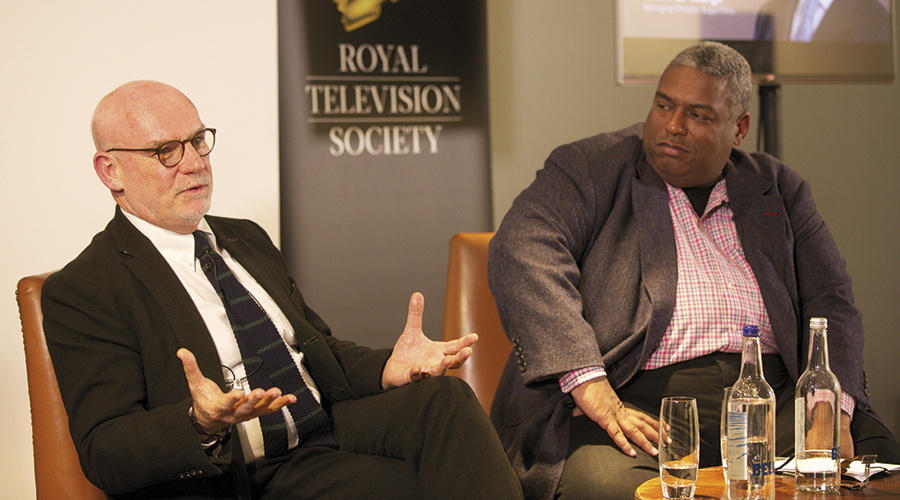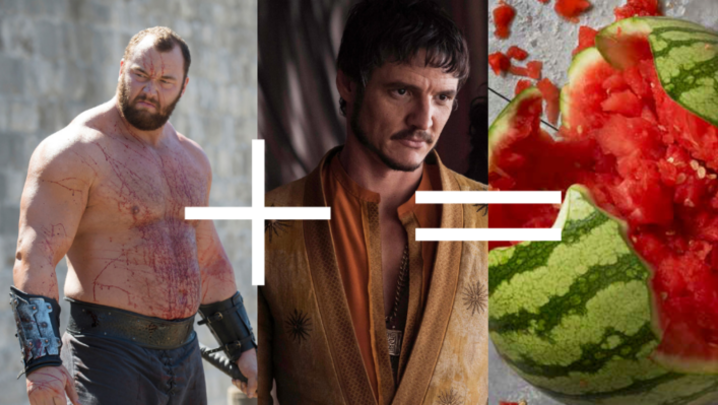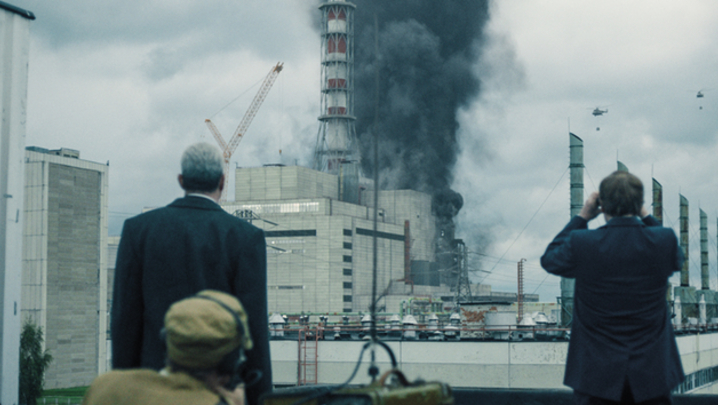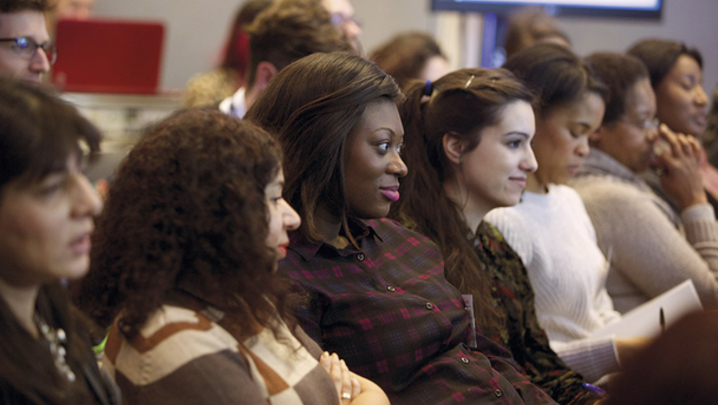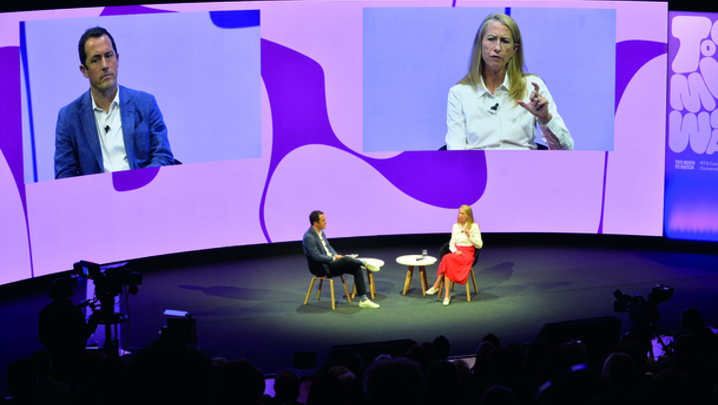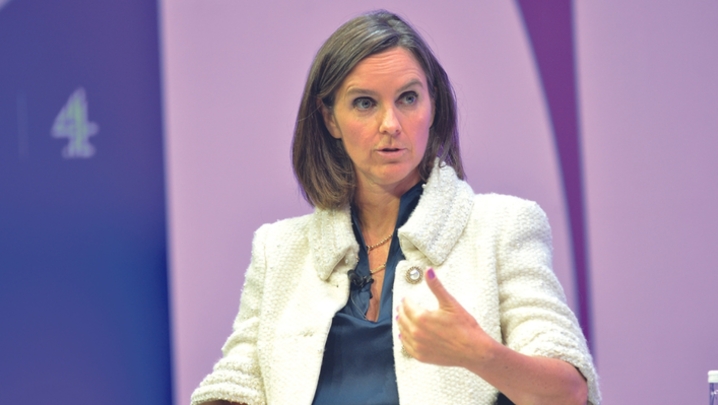Gary Davey explains why Sky is committed to content, innovation and service
Gary Davey is one of pay-TV’s most experienced executives. He was part of the team that launched Sky TV in the late 1980s. Now, after holding senior positions in Sky Italia, Sky Deutschland and Star TV (when he was based in Hong Kong), he is back in the UK. He was appointed Sky’s Managing Director for Content in January 2015.
At an RTS early-evening event at the beginning of this month, he told his audience how he’d been rescued from a life as a TV reporter by Rupert Murdoch more than 35 years ago.
“I was a news anchor in Australia,” recalled Davey, a self-deprecating and straight-talking Antipodean. “One day, I got a phone call from the board of News Corp – they told me Rupert Murdoch was going to call me tomorrow.
“I thought it was as joke but, sure enough, Rupert called and said: ‘I want you to come and work for me in New York.’ I said: ‘Doing what?’ He said: ‘I don’t know. We’ll figure it out when you get here.’ We still haven’t figured it out.”
His first job working directly for the media mogul had him trying to predict what was likely to happen in electronic media.
Cable TV was in the ascendancy in the US, but Davey championed satellite broadcasting. The idea was to challenge established markets in Europe.
In the early 1980s, he crossed the Atlantic and acquired “a tiny company called Satellite Television plc”. It had around 12 staff and was experimenting with an orbital test satellite beaming two hours of programming a day, Davey recalled.
“We didn’t even have a brand then. One of the staff suggested that we call it Sky Channel,” he said.
Getting to that point was not easy. Even Murdoch was sceptical that satellite broadcasting could work. “I remember there was a meeting in Rupert’s office,” said Davey. “By that time, he’d bought The Times of London. He really didn’t get the idea. He said: ‘Gary, the smallest satellite dish you’ve got is 12 feet in diameter. How is this ever going to be a business?’
“We were sitting at a table a bit like this [pointing to a round table the size of a small bicycle wheel]. Murdoch said: ‘It’s never going to work until you give me a satellite dish that big.’
“Remember, I was supposed to be the company’s expert on satellites. I said: ‘Sorry, boss, that’s physically impossible.’ But his vision was so strong.
“He said: ‘You’ve got three component parts to this thing – the set-top box, the electronics and the satellites themselves, all of which will evolve. That evolution will make this happen.’ He was absolutely right.”
By 1988, with the UK television industry coming to terms with Margaret Thatcher’s reforming zeal, Sky was ready for lift-off in London. In February 1989, Sky Television launched.
“The passion is still there today,” emphasised Davey. “The company has a unique DNA. One of the things I find moving is that whenever one of the executives talks about the business they always use three key words – content, innovation and service.”
Davey explained that, nowadays, Sky’s customers can access Sky content in seven different ways: live linear, recorded linear, catch-up, pull VoD, push VoD, box sets and NowTV. But Barb measures only two of these, he claimed.
The imminent launch of Sky Q would allow greater flexibility to watch, stream and record content, and provide Davey and his team with new ways of entertaining audiences.
“Sky Q is a really interesting challenge for me because it opens up all kinds of content opportunities that we’re only just starting to address,” he observed.
But finding accurate ways to monitor and assess who’s watching what is exercising minds at Sky. Davey gave the example of The Last Panthers, the recent, high-profile heist series. Only 16% of viewing was live, he said. “We don’t care how our customers consume our content, so long as they are engaged by it.”
Audience share as a viewership metric is banned at Sky. Overnights remain part of the currency of audience measurement, however.
“Share of viewing is evil incarnate,” fumed the content supremo. “It makes you a complete victim of the tyranny of ratings and it means that you are only thinking in terms of live linear.
“That makes no sense to us.… What matters most to us is that the customer is prepared to keep paying.
“The moment they lose that desire to keep paying for the product, we’re in big trouble.”
Netflix has been very successful in the UK, but at a time when we’ve grown as fast as we’ve ever grown
Sky’s consumption data for the channels owned by the BBC, ITV, Channel 4 and Channel 5 on the Sky platform is something the satellite company’s terrestrial rivals covet.
Why didn’t Sky give it to them, asked the evening’s chair, Pat Younge, Managing Director of Sugar Films.
“Because it’s ours,” Davey retorted.
But it is their shows that are being watched and the UK PSBs continue to drive a lot of Sky viewing, Younge persisted. Wasn’t that a bit one-sided?
“We’ve invested a lot of money in the infrastructure.…They’ve got Barb, which is there to measure the economic model that drives the advertising-supported industry. Our business is about pay-TV, which is a much longer-term time frame.
“It’s all about engagement, devices and convenience. And that information is really important to us. It is something we use for insight into our consumers’ behaviour. We’ve spent 27 years building this.”
Sky dropped the BSkyB name in late 2014, following the takeover of sister stations in Germany and Italy. The pan-European behemoth is utterly unrecognisable when compared with the four-channel fledgling that started transmitting to the UK in 1983.
The 2014 consolidation was driven by a desire for synergies, cost savings and as a means of future-proofing Sky in a fiercely competitive online world .
Recently, the company’s willingness to make more programmes, especially scripted shows, and reduce its heavy reliance on US imports has marked a significant break with the past.
Nowadays, the broadcaster commissions on both a pan-European and a local basis. Just how much it actually spends on UK-originated content (apart from sport) remains something of a sensitive issue.
Davey claimed that, over the next four or five years, Sky’s investment in non-sports content would double.
Younge asked for some specific figures. Davey demurred.
“This year,” he said, “Sky will spend about £5bn on content, including sport. ... Our entertainment budgets are growing at a faster rate than ever before.”
Was Davey bothered that paying £10m for the rights to a single mid-table Premier League match was diverting money away from drama and arts shows, probed Younge.
“An important part of my job is to make entertainment a primary reason to get Sky… then, the company can make choices,” said Davey. “One day, maybe, we’ll take less football and do more drama.… We’re on a journey. I am pretty happy where we are, but we’ve got a long way to go.”
So the investment in non-sports content is a strategic one, pressed Younge. “We’re not doing it to keep the production community happy. This is a business,” Davey replied. “We think through really carefully what’s going to drive customer engagement. If we get our storytelling right in entertainment, it’s just as engaging as football.”
Davey argued that Sky now had “a very aggressive portfolio” of content across the businesses in the UK, Germany and Italy. It was a sign of maturity that several British Sky dramas and comedies (a notoriously difficult genre to get right), including Stella, Trollied and Mount Pleasant, were returning series.
How did Sky approach drama from a pan-European perspective?
“The way that we’re managing it is we want the creatives to come from the bottom up,” said Davey. “I am not sitting around pushing ideas down to my guys.… We want great ideas and I don’t care where they come from – from Munich, Milan or anywhere.”
Each of Sky’s “communities” was developing programmes. “When we see an opportunity to develop on a big scale we jump on it.” The Young Pope, developed by Sky Italia and directed by the Oscar-winning Paolo Sorrentino, was an example of a scale production. Like The Last Panthers, The Lost Pope would be shown by Sky in the UK, Germany and Italy. Starring Jude Law and Diane Keaton, the producers include Sky Italia, HBO and Canal+.
Don’t expect to see too many clips of The Young Pope or, come to that, a lot of Sky shows on YouTube and other non-Sky websites.
“We talk about this all the time,” said Davey. “I think giving stuff away on the internet is not something we should do. I know it’s an old-fashioned view.”
Sky, however, has found that free-to-air can work for the broadcaster. “We have two free-to-air channels (Sky News and Pick). They’re very profitable and we’re quite happy with them,” said Davey.
Sky Italia’s free-to-air strategy was more aggressive than the UK’s but changes were coming: “In free-TV, we are powering our set-top boxes, particularly NowTV, with a digital terrestrial tuner. It will automatically capture all of the Freeview content.”
Meanwhile, last year’s decision to “merge” Sky Arts’ two channels into one channel was, according to Davey, a symptom of the company evolving into “a hybrid of linear and on-demand”.
“We’re all about deep engagement with our customers,” Davey stressed. “We’re looking for little niches of quiet passion. Sky Arts was perfect for that.” A new Sky Arts production hub based in Milan is up and running. One of its first initiatives is an up-market-sounding talent show, the pan-European eight-part Master of Photography. The series aims to find the best photographer on the continent.
Another high-profile show is Mystery of the Lost Caravaggio; digital restorers have recreated a Caravaggio painting stolen by the Mafia from a church in Palermo in 1969.
Davey (who likes to sketch on planes) concluded by saying that big changes were planned for Sky News this year. The old newsroom was being mothballed. A new, state-of-the-art digital facility was being built.
“Because we ran news and sports operations in Italy and Germany that had evolved at different times… we were able to take advantage of some really modern techniques,” he said. “The Munich newsroom is light years ahead of anything here. And the Italians have linked from that.… At Sky News [in London], we’ve had the opportunity to completely rethink the whole idea.”
Gary Davey was ‘in conversation’ with Pat Younge, Managing Director of Sugar Films, at The Hospital Club in central London on 4 February. The producer was Martin Stott, Head of Corporate and Regulatory Affairs at Channel 5.
Question & answer
Q
Do television channels have a future?
A
Gary Davey: Channels will always be around. I cannot see a future when they don’t exist. There is a revolution going on, but it’s happening a lot slower than people think…
Our customers still tune in for that big live event.… If we’re really smart we can use social media to make an episode premiere feel like a Champions League semi-final, by being live – and it’s essential that you are there as part of that live conversation.
We just need to manage linear TV and make it all feel like an event. Our industry will adapt. If we stand still, we’ll get rolled over.
People have been predicting TV’s demise on an annual basis for 40 years. Somehow, we’ve bounced back and we work our way through it.
Q
What is your view of privatising Channel 4?
A
Gary Davey: I don’t have a strong view, but I am always a little bit nervous when people start mixing public and private finance.
Everybody in the business will adapt to a changing environment, including Channel 4.
Q
Can you explain your strategy for Sky’s distribution business, Sky Vision, and the strategy for investing in production companies?
A
Gary Davey: We need to have a meaningful place in the world of distribution. We are investing an enormous amount of money in our own original content.
We need to have a structure by which we can optimise a return on that. Sky Vision is that vehicle.
In order to reach a critical mass, we need to have a balance between Sky original content and investments in distribution and production assets through partnerships…
From the point of view of Sky originals, we like to have distribution rights through Sky Vision, but we will never lose a good project by insisting on it.
Q
Your investment in independent producers is relatively sub-scale. Are you likely to scale up in the next few years?
A
Gary Davey: We will treat that opportunistically. We don’t have a fixed strategy that says we need to get to this critical point by such and such a time. We’re not frantically chasing acquisitions.
Q
Was Sky’s recent Showtime deal for Sky Atlantic only possible because of the scale created by merging Sky with Sky Italia and Sky Deutschland?
A
Gary Davey: I had always imagined a world in which we had HBO and Showtime [Sky already has a deal with HBO for exclusive rights]. They are the best two storytellers for television in the world. To be able to develop Sky originals, where we can proudly sit alongside those two propositions is, to me, the fulfilment of a dream.
The three entities working side by side is an enormously powerful thing.
It would not have been possible without the scale of Europe, that’s the key point. Sky UK would not have pulled off that deal on its own. The fact that we were able to develop a pan-European proposition, to be the custodians of their brand… those deals take a long time to come together… two years for the Showtime deal.
Q
How worried is Sky by competition from Netflix and Amazon Prime?
A
Gary Davey: We kicked this journey off way before either Netflix or Amazon Prime became an issue. This journey took a lot of development and a lot of thinking through.... I think we would have been on this journey with or without Netflix and Amazon.
The interesting thing about Netflix and Amazon is that nobody knows how successful any of those shows are. There is no data to prove whether their shows work or not.
The truth is, Netflix has been very successful in the UK, but at a time when we’ve grown as fast as we’ve ever grown and our churn rate is at the lowest level it’s been in 10 years.
The existence of Netflix does not seem to have damaged our customer base at all. It is a supplementary service.
The reinvention of Sky One
Gary Davey: ‘Sky One has always been a real challenge. It’s been through so many iterations. I know quite a bit about it because I launched the thing.
‘It was a mess and it’s been messy for a very long time. It’s probably been under-resourced and it’s probably too big an ambition to populate that channel with the right content unless you’ve got a budget…
‘We had to define a profile around the idea and then find the right content. Although it’s not yet perfect, something clicked last summer…
‘Supergirl was like the final piece in a really delicate puzzle. You, Me and the Apocalypse was the perfect Sky One show.’

